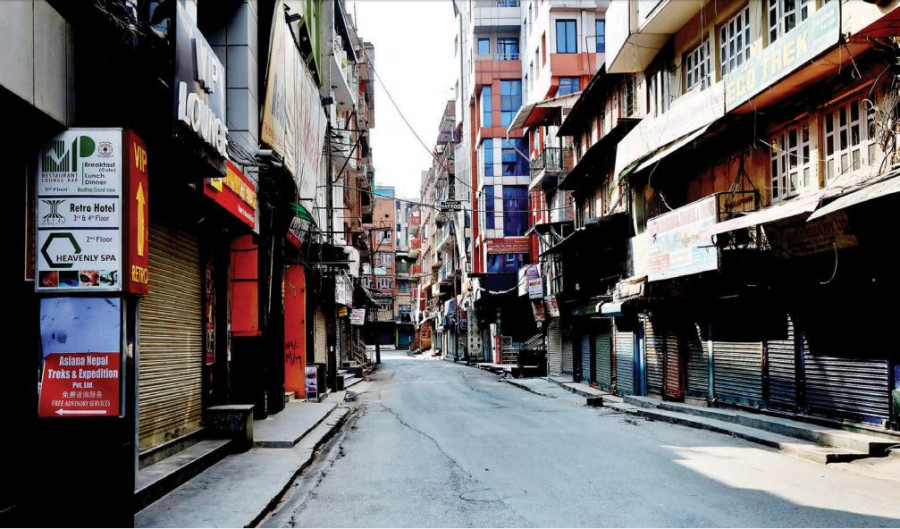National
Lockdown helps control rapid spread of the virus but it also lessens chances of more tests
Fear and halt in transportations services massively reduce the number of people visiting hospitals.
Arjun Poudel
On normal days, over 400 patients visit the outpatient department of Sumeru Hospital in Dhapakhel, Lalitpur. On Tuesday, there, however, were less than 15 patients who visited the hospital’s emergency ward.
“We did not even open the OPD,” said Hemraj Dahal, chairman of the hospital. “People with injuries and severe stomach pain and those who required emergency care were treated at the emergency ward.”
Sukraraj Tropical and Infectious Disease Hospital, in Teku, a government-run facility which has been designated as the primary treatment centre for possible Covid-19 patients, on the other hand, saw just one tenth of the visitors on Tuesday.
It could be because of lockdown but “people refrained from visiting the hospital also because of the fear of virus transmission,” a doctor at the hospital told the Post on condition of anonymity. “Over 100 patients visited our fever clinic yesterday [Monday].”
After a 19-year-old student who travelled from France via Qatar tested positive for Covid-19, concerns have grown among people about the possible spread of the virus.
Hours after announcing the second coronavirus case in the country—first was reported in January which was later declared recovered—the government on Monday evening declared a nationwide lockdown for a week starting 6am Tuesday.
Of the 100 patients who visited Teku’s fever clinic on Monday, two were admitted to the hospital on suspicion of carrying the coronavirus.
According to doctors at the hospital, nasal and throat samples of the two patients were sent to the National Public Health Laboratory for tests for Covid-19.
Public health experts say the lockdown as well as fears have prompted fewer people to visit the hospital. But this also reduces the chance of early diagnosis and treatment of the disease and prevention of transmission to the community, according to them.
Despite the World Health Organisation laying stress on tests and more tests, the number of tests in Nepal has been too low, largely due to a lack of resources and wherewithal.
After severe criticism that the government was not conducting adequate number of tests, the Ministry of Health and Population had decided to perform more tests and directed hospitals to run seperate fever clinics and sent samples of suspects for tests.
“Due to the lockdown and halt to public transport, people have not been able to visit hospitals,” Dr Baburam Marasini, former director at the Epidemiology and Disease Control Division, told the Post. “Lockdown is aimed at controlling the spread of the disease, but it also prevents patients from seeking treatment.”
Though lockdown is not applicable to those in need of medical treatment, there are concerns over ambulance services, as most of the ambulances in the country are not equipped well to transport people suspected to have coronavirus infections.
According to Marasini, lockdown is usually enforced to prevent mass movement of people from one place to another so as to control rapid spread of the virus. “But lockdown has not been as successful in other countries as it was in China, as even developed countries like the United States are still struggling to contain the virus,” he said.
Chances of more sample collection have certainly declined due to the restriction of movement, according to Kumar Thapa, chairman of Alka Hospital in Lalitpur.
“How can patients visit the hospital when security personnel deployed to enforce the lockdown prevent doctors and nurses from coming to work?” said Thapa. According to him, 35 patients visited the hospital’s emergency ward on Tuesday.
Dr Bikash Devkota, spokesperson for the Health Ministry, however, said that the lockdown was enforced to prevent mass movement of the people and that people needing medical care should be allowed to visit hospitals.
“Those who have returned from abroad or those who have met people travelling from abroad and those with fever and flu-like symptoms must visit hospitals,” Devkota told the Post. “Others who have not come in contact with such people and those who do not have any serious ailments should stay home and take precautions.”
As of March 22, more than 392, 159 Covid-19 infections have been reported in 196 countries and territories, with more than 17,138 deaths.




 9.7°C Kathmandu
9.7°C Kathmandu














